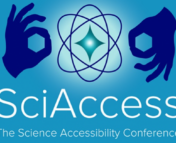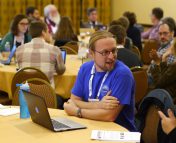Title: Access Needs: Centering Students and Disrupting Ableist Norms in STEM
Authors: Daniel L. Reinholz & Samantha W. Ridgway
First Author’s Institution: Department of Mathematics and Statistics, San Diego State University, San Diego, CA, USA
Status: Open access in Life Sciences Education
This Bite is part of Astrobites’ ongoing efforts to celebrate all cultures and identities in astronomy. Specifically, we’re highlighting disabled astronomers and research about accessibility during July as part of Disability Pride Month!
Despite as much as 25% of the Unites States population alone having some variety of disability, there is still stigma surrounding being disabled in academia. Though there has been a recent uptick in DEIA efforts in astronomy and other STEM fields, disabled academics are not always centered in the discussions. For the academy to truly become equitable, disabled students must be included in these DEIA efforts, and their accessibility needs must be met. That is, STEM classrooms, conferences, etc., must provide all individuals with the resources they need to fully participate.
Today’s paper discusses how STEM educators can center students’ accessibility needs to provide a more equitable learning environment. The authors — two STEM education scholars who are themselves disabled — center the discussion on the concept of access talk: the explicit statement and discussion of the resources those in your class, lab, research group, etc., need to participate fully. This discussion extends not only to individuals with visible disabilities, but also to those with invisible disabilities and those with accessibility needs that are not considered disability-related.
What needs might students have?
Often when considering students’ accessibility needs, the first needs that come to mind are things like whether a room is wheelchair accessible, or whether a student has access to sign language interpreters or an effective screen reader (with screen reader-compatible documents!). In addition to these more visible needs, the authors discuss many other accessibility needs that students might have. For example, an ADHD student may benefit from breaks during long meetings. A student with social anxiety may struggle in group discussion and may benefit from everyone being required to raise their hands to contribute, so they aren’t talked over. An autistic student might become overstimulated and need to step out of the class for a time. A student with diabetes may need to be allowed to have food or a drink in the lab, or be allowed to leave briefly to eat or drink something.
Further, students may have accessibility needs that aren’t explicitly related to disability, like being unable to turn a camera on during virtual classes because they don’t have one, or needing to miss class frequently because of work (socioeconomic accessibility needs). Minoritized students also may be talked over or face microaggressions or harassment by classmates. Changing group or classroom protocols to be more inclusive can help mitigate these issues for all students.
Normalizing access talk
To effectively address accessibility needs in these situations, it is important for educators and facilitators to foster an environment where students feel that they are being heard and helped. Importantly, the authors note that, “access needs cannot simply be assumed”: students with visible disabilities might have different needs than expected, and those with invisible disabilities will not be obvious at a glance. Further, many disabled academics feel pressured to downplay their access needs to be considered competent in academia. Normalizing access needs in academia is important to changing these issues and making the system more equitable. Before you can normalize the needs, you have to know the needs, and that’s where access talk comes in.
So, how do educators support their students and normalize access talk? The authors suggest a four-part strategy:
- Educators should encourage students to share their access needs during classroom introductions. The authors note that students may not immediately recognize or feel comfortable sharing their needs, but it is important to be explicitly open to recognizing them from the start. They suggest providing examples of some potential needs or opening up about your own needs first to start the discussion.
- Throughout the class, workshop, meeting, etc., educators should regularly check in with students to make sure their access needs are still being met. Since facilitators aren’t usually privy to everything going on in their students’ lives, they might miss evolving needs if they aren’t regularly checking in and students don’t open up about the changes themselves. For example, a student with a chronic or mental illness might need more support on some days and less on others, or a student with children may have changing childcare needs throughout the semester.
- Educators should be prepared to be flexible so that adjustments can be made as students express their needs. The authors acknowledge that this will not always be easy to do, but that an educator should still strive to do it to the best of their ability. They warn that when students express needs, and those needs are ignored, it decreases their trust in the educator/entity and often makes them more wary to share in the future.
- Educators should have some way for students to anonymously share their needs. The authors acknowledge that even if an educator is doing all they can to facilitate open access talk, some students may still feel uncomfortable sharing directly due to the stigma surrounding their needs, fear of being shut down, etc. Providing an anonymous feedback option allows these students to still have their needs met.
Disability does not discriminate: it affects people of all backgrounds, and could be affecting anyone in a classroom, visibly or otherwise. To best meet the needs of disabled students, instructors need to be open to hearing and supporting those needs. Something as simple as changing the way we approach access needs, e.g. by using the steps outlined in today’s paper, can make a huge difference in fostering useful discussion. This process may not be easy – it requires a level of vulnerability, flexibility, and commitment on the part of instructors that they may not be naturally comfortable with or have outside support for – but it is a necessary first step in creating a more equitable system for all.
Edited by: Briley Lewis and Jessie Thwaites
Featured image credit: Daily Iowan




